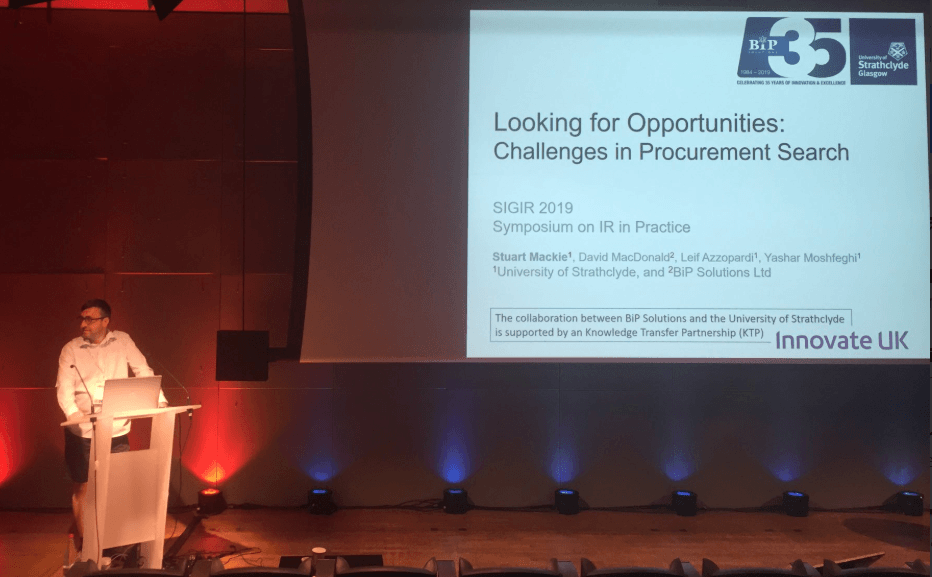BiP Solutions and The University of Strathclyde are currently undertaking a 2½ year Knowledge Transfer Partnership (KTP), part-funded by Innovate UK, the UK Government’s innovation agency.
The KTP project team is led by Dr. Stuart Mackie, who completed his Ph.D. in Computing Science at the University of Glasgow (2018), specialising in information retrieval, natural language processing, machine learning, and data science. Here Dr. Mackie explains what the aims of the KTP are, and discusses his recent presentation of a paper on behalf of the KTP at the world’s leading conference on search engine technology.
Knowledge Transfer Partnership
BiP Solutions has partnered with the University of Strathclyde to access academic expertise in the areas of Information Retrieval, Machine Learning, and Data Science. The aim of the KTP project is to embed key technical expertise within BiP Solutions in order to enable the development of the next generation of business intelligence products and services. Specifically, the goal of the KTP project is to improve the relevance of search results of the procurement contracts search engine within BiP Solutions’ business intelligence solution, Tracker. Further, the KTP project also aims to support data-driven decision making via promoting a culture of experimentation, evaluation and analysis.
The KTP project team is working to capture and leverage search user interaction data and deploy state-of-the-art machine learning technologies into BiP’s search engine products – to improve the relevance of search results for BiP customers. The KTP project team is also working to implement a redesigned search user experience, to deploy an online A/B testing infrastructure, and to develop evaluation metrics and an analytics dashboard for the Tracker product.
The KTP project builds on the work from a successful DataLab-funded project – focusing on search relevance engineering – where we built a domain-specific dataset (i.e., test collection) for evaluating Tracker’s procurement contracts search engine, and implemented a Lucene-based search engine evaluation framework for conducting a thorough evaluation of different search algorithms.
ACM SIGIR Conference
Recently, we participated in the ACM SIGIR Conference on Research and Development in Information Retrieval. The SIGIR conference is the premier venue for the publication and dissemination of research relating to search engine technologies. We presented a paper in the SIGIR 2019 Symposium on IR in Practice (Industry Track), along with presentations from Amazon Alexa, Netflix, Comcast Applied AI Research Lab, Facebook, University of Sheffield, Ancestry.com and Thomson Reuters, amongst others. You can read and download our paper here.
For businesses wishing to tender for competitive opportunities, finding relevant procurement contract notices presents a challenging professional search task. This search task involves business users searching for economic opportunities, with high value associated with the outcomes. Our paper outlined the “Challenges in Procurement Search”:
- Query specification – search queries are user-curated complex Boolean expressions, often many hundreds of terms in length. How can we best capture user information needs?
- Commercial Relevance – a contract matching a customer’s query terms may not be commercially relevant due to many business factors. How can we shape the relevance function to reflect this?
- Temporal Relevance – businesses need to find contracts as soon as they are published, to maximise bid preparation time. How can we ensure customers receive relevant contracts as soon as they are available?
- Data Sparseness – with lower click volumes observed compared to commercial web search engines, how can we bootstrap supervised machine learned models with less user interaction data?
- Bias & Regulation – public procurement is a highly legislated area. How can we ensure that machine learned models and recommender systems are fair and unbiased?
The challenges we highlighted in this paper will be addressed throughout the KTP project as it continues.
You can learn more about BiP’s range of digital business intelligence solutions here.
The post BiP Knowledge Transfer Partnership examines search engine technology appeared first on BiP Solutions.
